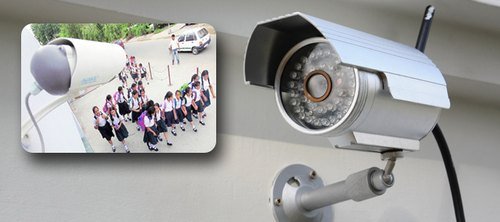
the Tripura government has directed all private schools across the state to install closed-circuit television (CCTV) systems. The order, which applies to every privately run educational institution, is intended to protect students and staff while increasing accountability within school premises.
Officials said the directive comes in response to growing concerns around student safety and the need for transparent monitoring in educational environments. The Education Department has given schools a set timeline to complete installations, warning that non-compliance will result in serious consequences, including revocation of recognition.
Read More: Tripura Cycling Event: Governor Rides as CM Unveils Growth Plan
Government Prioritizes School Surveillance
The Tripura CCTV order in private schools is part of a broader initiative to modernize security infrastructure in educational institutions. According to the directive, cameras must cover entry and exit gates, hallways, classrooms, and outdoor areas such as playgrounds. The footage must also be stored for a minimum of 30 days.
Education Minister Ratan Lal Nath said, “Safety of our children is non-negotiable. This decision is not aimed at surveillance for its own sake, but to ensure that schools remain secure and transparent places of learning.”
The government has also made it clear that the cost of installation will have to be borne by the institutions themselves. To aid implementation, the department has circulated technical guidelines specifying minimum camera quality, night vision capabilities, and data storage protocols.
Clear Timeline and Strict Enforcement
To avoid ambiguity, the government has laid out a specific timeframe. Private schools have been granted 60 days to complete the installation of CCTV systems. After this period, inspection teams will visit schools to verify compliance.
Failure to adhere to the directive may result in strong punitive action. These could include warnings, temporary suspension of licenses, or even permanent de-recognition. In extreme cases, schools that defy the order could face legal proceedings under child protection laws.
“This is not a symbolic rule. Monitoring and enforcement will be strict. We cannot afford to take chances with student safety,” said a senior official from the Education Department.
The move has received mixed reactions from school managements. While many principals welcomed the focus on safety, some raised concerns about funding, especially for smaller institutions operating on tight budgets.
Parents and Teachers Support the Move
Parents, however, have largely welcomed the initiative. With incidents of bullying, harassment, and staff misconduct making headlines across the country, guardians see CCTV as an added layer of assurance.
“Knowing there’s surveillance in place makes me feel more secure about sending my daughter to school,” said Rupa Majumder, a parent from Agartala. “It’s not about mistrust. It’s about making sure everyone feels safe.”
Teachers’ associations in the state have also shown cautious support. While some expressed concern over constant surveillance, others acknowledged the benefits of added transparency. According to them, the system could protect teachers from false accusations and offer valuable documentation in case of disputes.
The Tripura CCTV order in private schools also aligns with national efforts to enhance child safety. Other states, including Delhi and Maharashtra, have implemented similar mandates in recent years, although enforcement has varied.
Digital Integration and Data Privacy
As part of its policy, the state has advised schools to maintain strict data privacy. Access to recorded footage will be restricted to authorized personnel, and usage logs must be maintained. Schools are also expected to avoid misuse of recordings or sharing of footage without prior permission.
The state government may, in future phases, introduce centralized data access for education inspectors and child safety officers, although such steps would be taken only after careful consideration of privacy rights.
Officials clarified that there are no plans to install facial recognition or AI-based analytics at this stage. “Our focus is on visibility and safety, not on intrusive surveillance,” said an official from the technical advisory team.
To support rural schools or institutions with limited resources, the government is exploring possible subsidies or vendor partnerships that could lower costs. Talks are underway with local tech companies to develop affordable installation packages.
The Tripura CCTV order in private schools signals the government’s firm intent to create safer educational spaces. With a clear roadmap, defined technical standards, and a no-tolerance policy toward non-compliance, the administration hopes to instill greater responsibility and trust in the schooling system.
While the move may present financial and logistical challenges for some institutions, the broader message is clear: student safety comes first. As schools work to meet the deadline, the initiative could serve as a model for other states seeking to strengthen school security without compromising transparency or privacy.



